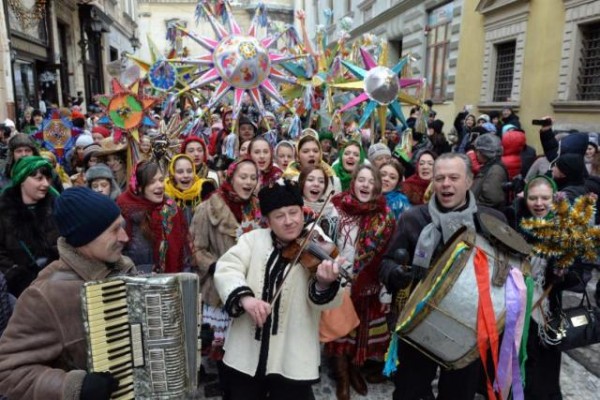
People, wearing traditional Ukrainian clothes, sing folk songs as they celebrate Orthodox Christmas in the western Ukrainian city of Lviv on Jan. 8, 2015. Photo: YURIY DYACHYSHYN/AFP/Getty Images
ishtartv.com-
ibtimes.com
By Lydia Tomkiw
On 01/06/16 While Christmas trees and
decorations have been taken down in many countries, celebrations are just
beginning in others. In Russia, Ukraine, Greece, Israel and several other
nations, Orthodox Christians, Greek Catholics and Coptic
Christians will celebrate Christmas Wednesday 13 days after the well-known
Dec. 25 festivities.
Why
is Christmas celebrated Jan. 7? The difference in dates goes back several
centuries to when Pope Gregory XIII established the Gregorian calendar in 1582. The Gregorian calendar has
become known as the “Western calendar” and is internationally followed by many
governments with Christmas celebrated Dec. 25. The Gregorian calendar was
introduced to correct the Julian calendar that was created under the rule of
Roman leader Julius Caesar and dates back to 46 B.C. Not all religions have
switched over to the Gregorian calendar, which accounts for celebrations on
Jan. 7 .
Even
though the Russian Orthodox Church uses the Julian calendar to celebrate
religious holidays, the country’s government follows the Gregorian calendar, a
common occurrence in many countries. Some churches, including the American
Orthodox Church, have chosen to use the Revised Julian Calendar which means
they celebrate Dec. 25. Armenia Orthodox followers in Israel buck both trends
by celebrating Christmas Jan.
18.
Which
churches and countries celebrate in January? There are 15 different Eastern
Orthodox churches and several, including ones in Russia, Ukraine, Serbia, Georgia
and Macedonia, all celebrate Jan. 7 . Ethiopian and Egyptian
Coptic churches also celebrate in January. Russia alone is home to 39 percent of the world's Orthodox Christians and over 85 percent of the population chooses to celebrate
Christmas in January.
What
are some of the traditions? Traditions vary across countries and religions, but
many Orthodox Christians, Greek Catholics and Coptic Christians choose to
abstain from meat products or alcohol in the 40 days leading up to Christmas
and fast during Christmas Eve. A mass is usually celebrated on Christmas Eve in
the evening.
In
Russia and Ukraine 12-course meat- and dairy-free meals are eaten on Christmas
Eve to represent the 12 apostles. Common dishes include borsch, dumplings and
stuffed cabbage. On Christmas day, caroling around neighborhoods is a common
tradition. In Ethiopia church services and sporting tournaments are part of the
holiday while in Serbia families traditionally go out to look for an oak branch to decorate their homes.
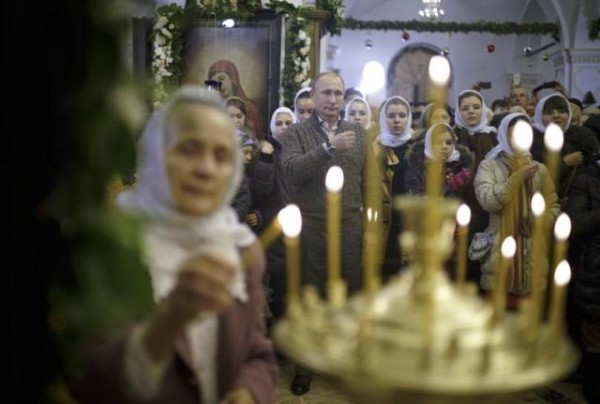
Russian President Vladimir Putin attends an Orthodox Christmas service at a local cathedral of the village Otradnoye in Voronezh region Jan. 7, 2015. Most Orthodox Christians celebrate Christmas according to the Julian calendar on Jan. 7, two weeks after most western Christian churches that abide by the Gregorian calendar. Photo: Reuters/Alexei Druzhinin/RIA Novosti/Kremlin
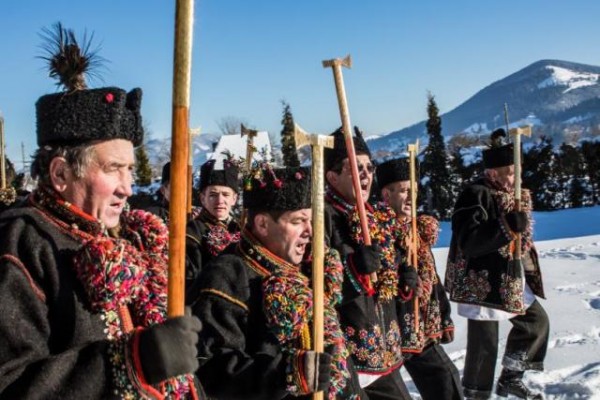
Men wearing traditional Hutsul clothing take part in Orthodox Christmas celebrations at Holy Trinity Church on Jan. 7, 2015 in Iltsi, Ukraine. The men gather in groups and march around the church three times before spending 12 days traveling house to house singing songs until they've visited every home in the village. Photo: Brendan Hoffman/Getty Images
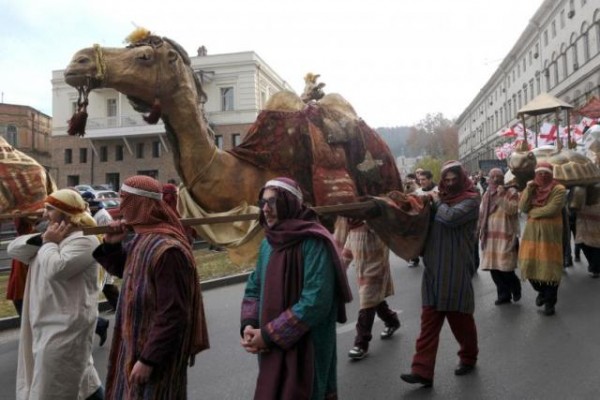
People take part in the religion procession 'Alilo' as they celebrate the Orthodox Christmas in central Tbilisi on Jan. 7, 2015. Orthodox Christians celebrate Christmas today in the Middle East, Russia and other Orthodox churches that use the old Julian calendar instead of the 17th-century Gregorian calendar adopted by Catholics, Protestants, Greek Orthodox and commonly used in secular life around the world. Photo: VANO SHLAMOV/AFP/Getty Images
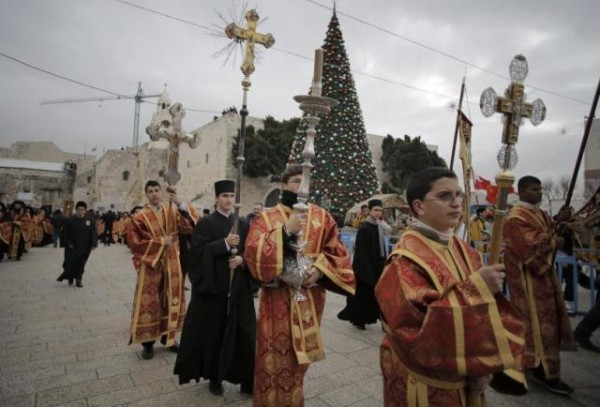
Members of the Greek Orthodox clergy wait for the arrival of the Greek Patriarch of Jerusalem Metropolitan Theophilos before the Eastern Orthodox Christmas procession outside the Church of the Nativity in the West Bank town of Bethlehem Jan. 6, 2015. Photo: Reuters/Ammar Awad
|